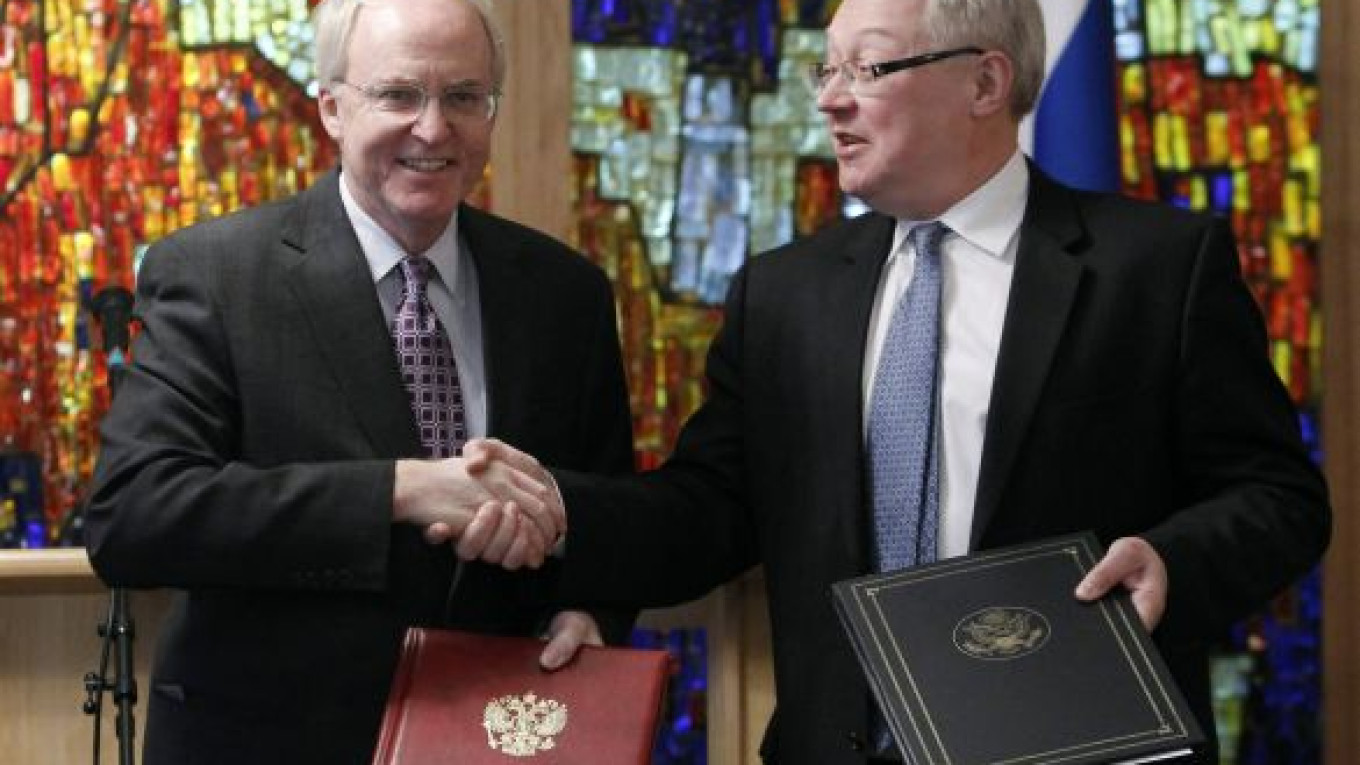President Dmitry Medvedev has called for a businesslike approach to nuclear cooperation with the United States after a historic accord cleared the way for the two countries to exchange technology and open nuclear joint ventures.
The agreement on peaceful nuclear cooperation was passed by the U.S. Congress in December, but it formally came into force when U.S. ambassador John Beyrle and Russian Deputy Foreign Minister Sergei Ryabkov exchanged diplomatic notes at a low-key ceremony (video)? in Moscow on Tuesday morning.
“This is a major step forward in U.S.-Russian civil nuclear cooperation,” said Beyrle, speaking in Russian as he and Ryabkov faced reporters after the exchange.
The 123 agreement, so called because its requirements are set out in Section 123 of the U.S. Atomic Energy Act, was first signed by Beyrle's predecessor William Burns in 2008, but was withdrawn by the Bush administration after Russia's war with Georgia. U.S. President Barack Obama sent it to Congress again in 2010 as an apparent reward for Russian help with the Iranian nuclear question.
It allows the two countries to exchange nuclear technology and strengthen non-proliferation efforts through the sale of safe fuel to countries that want to develop civilian nuclear programs, while Russian and U.S. research laboratories may develop new forms of the fuel. It also opens the way for Russian and U.S. firms to collaborate on commercial nuclear projects.
“It opens up new technologies — technologies that will help us to combat the global threat of nuclear proliferation, as well as to create new commercial opportunities for U.S. and Russian companies to produce cleaner, safer, and more secure nuclear energy,” Beyrle said.?
Neither diplomat named specific companies or projects, but Ryabkov said “concrete positive results” would be seen “soon.”
But while the Americans claimed a victory for Obama's pledge to reduce proliferation, the Russian side seemed coldly focused on the bottom line.?
“The main thing is not to politicize [cooperation], but to treat it like business,” Medvedev told Rosatom chief Sergei Kiriyenko at a meeting later in the day.
“It is extremely important from the economic point of view, and America is a key nuclear market,” Kiriyenko told the president, in comments carried by Interfax.?
Russia already supplies about 40 percent of fuel for U.S. nuclear power stations, and in the past year it signed contracts for $4.9 billion in low enriched uranium deliveries, Kiriyenko said.
Rosatom said in e-mailed comments that the new agreement would lead to “joint ventures on U.S. territory using Russian technology for uranium enrichment,” but would not involve centrifuge technology.?
In the past, Kiriyenko has hinted at joint production with U.S. firms of small-capacity reactors for sale to developing countries.
Russia's atomic energy agency has vigorously promoted the idea of a global “nuclear renaissance” as a way to meet growing energy demand and reduce dependence on fossil fuels. The company will soon have representatives posted at Russian embassies to help cultivate its foreign market.
Kiriyenko told Medvedev that Rosatom expects to land orders to build 30 more generating units abroad in addition to contracts it has already signed. The company expects foreign orders to grow by at least 50 percent to $30 billion in 2011. Rosatom's profits were up more than 50 percent year on year in 2010 to more than 60 billion rubles ($1.96 billion).?
Russian environmentalists, however, fear that the 123 agreement will open the way for the United States to transfer its nuclear waste to Russia for reprocessing — a task that green groups say Russia is ill equipped for.
Neither diplomat denied the claim that Russia would take delivery of U.S. nuclear waste. However, Rosatom insisted that the agreement did not provide for delivery of U.S. spent nuclear fuel, and that “Russia does not import any spent nuclear fuel of foreign origin.”
Monday's deal follows the December ratification of the New START treaty by the U.S. Congress and the initialing of a protocol on replacing weapons-grade nuclear fuel in Russian research reactors with a low-enriched alternative.?
A Message from The Moscow Times:
Dear readers,
We are facing unprecedented challenges. Russia's Prosecutor General's Office has designated The Moscow Times as an "undesirable" organization, criminalizing our work and putting our staff at risk of prosecution. This follows our earlier unjust labeling as a "foreign agent."
These actions are direct attempts to silence independent journalism in Russia. The authorities claim our work "discredits the decisions of the Russian leadership." We see things differently: we strive to provide accurate, unbiased reporting on Russia.
We, the journalists of The Moscow Times, refuse to be silenced. But to continue our work, we need your help.
Your support, no matter how small, makes a world of difference. If you can, please support us monthly starting from just $2. It's quick to set up, and every contribution makes a significant impact.
By supporting The Moscow Times, you're defending open, independent journalism in the face of repression. Thank you for standing with us.
Remind me later.


